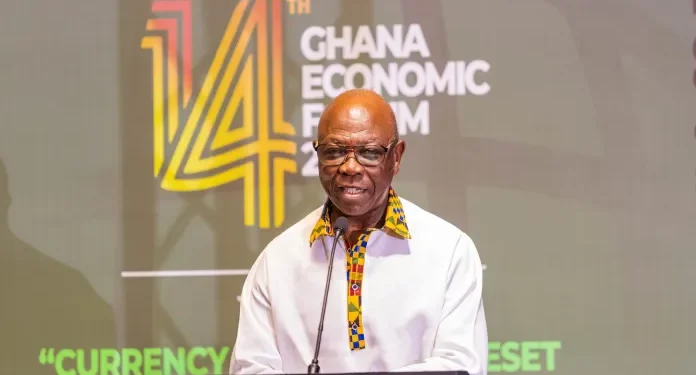GEF Chair Edward Annan Calls for Stronger Local Industry to Anchor Ghana’s Economic Stability
Chair of the Ghana Economic Forum (GEF), Edward Annan, has stressed that Ghana’s long-term economic stability will depend on how well the country harnesses and strengthens its local industries to drive sustainable growth and job creation.
Speaking at the opening of the 14th Ghana Economic Forum in Accra, themed “Currency Stability – A Reset for Sustainable Economic Growth,” Mr Annan noted that sustainable development cannot be achieved through policy rhetoric but through practical interventions that channel capital, innovation and productivity into homegrown enterprises capable of retaining value locally.
“The real prosperity of this nation lies not only in what we grow, but in what we make from what we grow,” he remarked.
According to him, Ghana stands at a critical economic juncture, as persistent currency volatility, supply chain disruptions and global pressures continue to expose the weaknesses of the country’s import-dependent structure.
He maintained that transforming the economy from one reliant on raw material exports to one that processes and industrialises locally is no longer a choice but an economic imperative.
Mr Annan underscored that currency stability must go hand in hand with productivity growth and competitiveness, noting that a resilient economy rests on a foundation of innovation, skills development, and deliberate policy support that attracts long-term productive investment rather than speculative inflows.
He called for deeper collaboration among government, the private sector, academia and civil society to implement targeted reforms that translate into industrial expansion, export growth and employment creation.
“Economic resilience is not built overnight, but through consistent implementation of evidence-based policies and a disciplined reform agenda,” he said.
The GEF Chair further urged policymakers to move beyond discussions to measurable outcomes that strengthen Ghana’s industrial base and growth fundamentals.
“As a nation, we must not simply aspire to be competitive, we must act decisively to become so,” he emphasised, adding that competitiveness requires robust supply chains, reliable energy, supportive regulations and access to finance for productive sectors.
Mr Annan expressed optimism that Ghana can become more innovative, inclusive and globally competitive if it accelerates industrialisation and technology adoption, particularly in agriculture and agribusiness.
He concluded by urging both government and the private sector to ensure that commitments made at the Forum lead to tangible economic transformation capable of strengthening the cedi and sustaining long-term growth.








